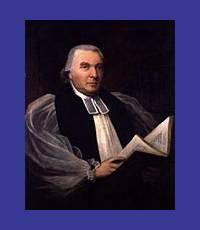Seabury was born on the 30th of November 1729, in
Ledyard, Groton, Connecticut.
His father, Samuel Seabury (1706—1764), originally a Congregationalist
minister in Groton, was ordained deacon and priest in the Church of
England in 1731, and was a rector in New London, Connecticut, from 1732
to 1743, and in Hempstead, Long Island, from 1743 until his death.
Seabury graduated from Yale in 1748 and studied theology with his
father. He also studied medicine at Edinburgh in 1752—1753. Seabury was
ordained deacon by the bishop of Lincoln and priest by the bishop of
Carlisle in 1753.
He became a missionary in New Brunswick, New Jersey, in 1754, and rector
in Jamaica, New York, in 1757. He became rector of St. Peter’s,
Westchester, New York, in 1766.
Seabury was a loyalist and was one of the signers of the White Plains
protest of April 1775 against “all unlawful congresses and committees,”
and wrote the Free Thoughts on the Proceedings of the Continental
Congress by a Westchester Farmer, followed by a second “ Farmer’s
Letter,” The Congress Canvassed (both 1774). These were answered by
Alexander Hamilton in A Full Vindication of the Measures of the
Congress, from the Calumnies of their Enemies.
A third “Farmer’s Letter” replied to Hamilton’s
View of the Controversy between Great Britain and her Colonies
(1775), in a broader and abler treatment than in the previous pamphlets.
Seabury’s “Farmer’s Letters” rank him as the most vigorous American
loyalist controversialist and as one of the greatest masters of style of
his period.
He was arrested in November 1775 by a mob of lawless Whigs, and was kept
in prison in Connecticut for six weeks; his parochial labors were broken
up, and after some time in Long Island he took refuge in New York City,
where he was appointed in 1778 chaplain to the King’s American regiment.
After the war, he returned to ministry and was highly regarded by his
colleagues and parishioners. He continued the rest of his life to draw a
pension from the King of England.
Samuel Seabury
